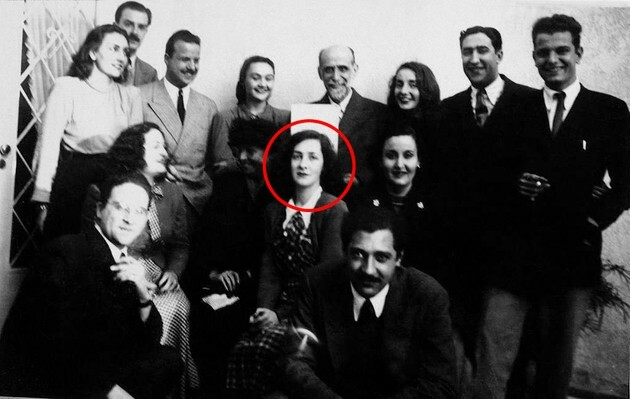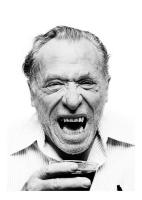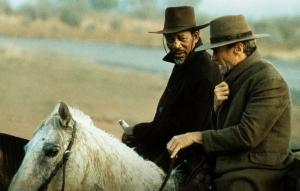Ida Vitale: 10 Essential Poems
Ida Vitale, Uruguayan poet member of the generation of 45 and representative of essentialist poetry, is one of the most important poetic voices in the Spanish-American world.
Says the critic José Ramón Ripoll in an article entitled "Through the others, 10. Ida Vitale or the reduction of infinity ", that Vitale's work oozes three essential elements: life, ethics and verb.
What is alive in Vitale's poetry, says Ripoll, does not refer to a biographical sense but an essential one, the song of life itself, in its present, which becomes a vivid and eternal image. What is ethics is that which moves her to look at the other and give him his space, his being, her dignity. Finally, the verb gives him the key, the bridge, to approach the poetic event.
Let us know in this article some of the poems of Ida Vitale, whose career and legacy has allowed her to rub shoulders with figures such as Octavio Paz or Juan Carlos Onetti.

1. Fortune
In this poem, Vitale reviews the privileges of the existence of women, traversed by the threads of a story that opens an incipient freedom so that women are simply human.
For years, enjoy the mistake
and the amendment of it,
to have been able to speak, to walk free,
not exist mutilated,
not enter or yes in churches,
read, listen to beloved music,
to be in the night a being as in the day.
Not being married in a business
measured in goats,
suffer rule of relatives
or legal stoning.
Never parade anymore
and not admit words
put in the blood
iron filings.
Discover for yourself
another unforeseen being
on the bridge of gaze.
To be human and woman, neither more nor less.
2. Mysteries
For the poet, love is presented not as a raging fire, but as a grace, a light that is turned on to witness what is shared, what is expected.
Someone open a door
and receive the love
raw.
Someone asleep blind
deaf, knowingly,
find between your dream,
sparkling,
a sign tracked in vain
in wakefulness.
Between unknown streets I went,
Under skies of unexpected light
He looked, he saw the sea
And she had someone to show it to
We expected something:
and the joy went down,
as a prevented scale.
3. Exiles
Break the roots, walk the road without a rear view mirror, feel vertigo, fear loneliness... That is the destiny of those who suffer exile, those who are pushed into the night of uncoat, of strangeness.
… After so much here and there coming and going.
Francisco de AldanaThey are here and there: incidentally,
in nowhere.
Every horizon: where an ember attracts.
They could go to any fissure.
There is no compass or voices.
They cross deserts that the brave sun
or that the frost burns
and infinite fields without the limit
that makes them real,
that would make them solid and grass.
The gaze lies down like a dog,
without even the resource of moving a queue.
The gaze lies down or backs away,
is sprayed through the air
if nobody returns it.
It does not return to the blood nor does it reach
to whom it should.
It dissolves, just by itself.
4. This world
Symbols of a space of its own, of the construction of being, of its internal habitation, of belonging to itself as an act of freedom, are those that Ida Vitale offers us in this poem. Let your voice invite us to discover your world.
I just accept this enlightened world
true, fickle, mine.
I only exalt its eternal labyrinth
and its safe light, even if it is hidden.
Wake up or between dreams,
his grave ground floor
and it's your patience on me
the one that flourishes.
It has a deaf circle,
limbo perhaps,
where I wait blindly
the rain, the fire
unchained.
Sometimes its light changes
it is hell; sometimes rarely
the Paradise.
Maybe someone
half open doors,
To see beyond
promises, successions.
I only live in him,
I hope from him,
and there is enough wonder.
I am in it,
I stayed,
reborn.
5. Night accidents
In the silence of the night the words make their entrance, translators of the conscience, of the fears, of the very depth of the soul. That space of the night when everything is silent is the opportunity to visit the ruminant word of our interior, which is only silenced by the music.
Minute words, if you lie down
they communicate their concerns to you.
The trees and the wind argue you
together telling you the irrefutable
and it is even possible that a cricket appears
that in the middle of the wakefulness of your night
sing to show you your mistakes.
If a downpour falls, it will tell you
fine things that pierce and leave you
the soul, oh, like a pincushion.
Just opening yourself up to music saves you:
she, the necessary one, refers you
a little less arid to the pillow,
soft dolphin ready to accompany you,
away from burdens and reprimands,
among the rare maps of the night.
She plays to match the precise syllables
that they sound like notes, like glory,
that she accepts to be cradled,
and make up for the ravages of days.
6. A painter reflects
Word and image, poetry and painting, an ancient marriage that is verbalized in this poem, from which the arts of the painter are evoked. If, on the one hand, a writer like José Saramago, in the novel Manual of painting and calligraphy, He reflects on the limits between the two, Vitale extends the bridges, the canvas continues in the rhythmic echoes of the word that evokes vivid pictures in the imagination.
How few things do you have
this quiet world,
beyond my things.
There is that sun that burns
the neighboring walls,
laying cables
and here it does not enter because
what would the sad man think,
the wing of the hat
that, lost his cup,
no longer leaves the wall
and I have for the Ellipse.
And the rag flowers,
what graffiti dreamed
with being fresh and beautiful
and they survive withered,
What would they say, my eternal ones?
My ocher, lilac, pink,
my skewed ivories
by shadows that weave
my lines you guess,
they are, in the quiet kingdom of her.
Never mind the sun, outside.
That Bologna is enough
and the burning brick
and in mere light and shadows
I left between my things.
We will meet
yes in the little park,
I paint and think of Corot.
I'm going to be even lighter:
in light watercolors
last, that require
the passing of the forms
by the haze
a sufficient color.
I'll paint a mandolin
accompany the dance
of my provisions
each other with their shadows,
with lights and with strokes
how subtle they embrace
my beloved objects.
And already all of Bologna
it will be a soft pink
without any presumption,
about the fatal boredom
yes, nineteenth-century,
of dairy and haystacks,
chicken coops and skies.
Close to my sisters,
I will travel for my Things.
6. Residual
The concern about the passage of time, about the capricious desires of memory, sometimes vivid, sometimes opaque, is present in the poet's work. It is the universal concern: in the face of what has been lived, only the vertex of a wake seems to be first foamy and vibrant, then the open compass that gives up its vibration until it melts into a uniform ocean. But if something remains, what remains, is it what they call poetry? Vitale wonders.
Short life or long, everything
what we live is reduced
to a gray residue in memory.
Of the old trips remain
the enigmatic coins
that pretend false values.
From memory it just goes up
a vague powder and a perfume.
Is it poetry?
7. Book
Vitale presents us with a song to the forgotten, to the badly loved one of modern times, to whom the book is hardly exhibited on the shelves of houses.
Although no one is looking for you anymore, I am looking for you.
A fleeting phrase and I collect glories
from yesterday to the taciturn days,
in the language of unforeseen profusions.
Language used by a pilgrim wind
To fly over dead stillness
It comes from an imaginary sweet season;
goes towards an inexorable time alone.
Gift that is offered between glossy voices,
for so many misunderstandings, he persists
to sink, deep palm root,
convicted of understanding with the few.
8. Natural leaves
A leaf is a promise on which memory and sensations are built. They, together with the pencil, are the setting where the hidden spirits materialize, in the form of words or drawings, of lines. They are the promise of, one day, to be heard when we have no voice.
... or rooting, write in an identical space
always, home or detour.
Jose M. AlgabaI drag a pencil through the changes,
a sheet, just of paper, that I would like
like a tree, lively and reborn,
that distilled sap and not useless sadness
and not brittleness, dissolutions;
a leaf that was hallucinated, autonomous,
able to enlighten me, taking me
to the past by an honest route: open
the walls blinded and clean
the true story of the defaced
tricks that succeed.
Sheet and pencil, for a clean ear,
curious and suspicious.
9. The word
Vitale, like many poets, cannot escape the temptation to write about this singular lover that is the word. Reflecting on the word and the creative act itself, on the text itself that is written and discussed at the same time, It is an exercise in aesthetic self-reflexivity, the Venezuelan researcher Catalina Gaspar would say in her book Poetic lucidity. In this poem, this look arises.
Expectant words,
fabulous in itself,
promises of possible meanings,
graceful,
aerial,
airy,
ariadnes.A brief mistake
makes them ornamental.
Its indescribable accuracy
erases us.
10. Drops
The poet looks at life, watches it manifest. This time they are the drops that touch life with their grace, that fall on the just and the unjust, that leave their mark on the crystals and leave imprinted meanings on them. What do the drops say?
Do they hurt and melt?
They just stopped being the rain.
Sleepers at recess,
kittens from a transparent kingdom,
they run free through glass and railings,
thresholds of its limbo,
they follow each other, they chase each other,
maybe they go, from loneliness to weddings,
to melt and love each other.
They dream another death.
Biography of Ida Vitale

Born in 1923, Ida Vitale is a poet, essayist, university professor, translator and literary critic originally from Montevideo, Uruguay, raised in an immigrant family Italians.
In that country, Ella Vitale studied humanities and worked as a teacher. She is considered part of the generation of 45, a movement of Uruguayan writers and artists who came onto the public scene between 1945 and 1950. Members of this movement include Ángel Rama, Vitale's first husband, and Mario Benedetti.
Throughout the sixties, she directed several periodical publications in Uruguay such as the newspaper Epoch and the magazines Clinamen Y Maldoror.
She had to go into exile in Mexico in 1974, as a result of the repression of the Uruguayan dictatorship, which ruled between 1973 and 1985. In Mexico, she met Octavio Paz, who opened the doors to the publishing and literary world of the Aztec country.
Although she returned to Uruguay in 1984, she moved to Texas in 1989 with her second husband, the poet Enrique Fierro. She lived there until 2016, when she was widowed. She currently resides in Uruguay.
See also 6 essential poems by Mario Benedetti.
Ida Vitale Books
Poetry
- The light of this memory (1949).
- Faithful (1976 and 1982).
- Silica garden (1980).
- Seek the impossible, (1988).
- Imaginary gardens (1996)
- The light of this memory (1999)
- Dent and sieve (2010).
- Survival (2016).
- Sleet lows (2016)
- Poetry collected. 2017.
Prose, criticism and essay
- Cervantes in our time (1947).
- Manuel Bandeira, Cecilia Meireles and Carlos Drummond de Andrade. Three ages in current Brazilian poetry (1963).
- Juana de Ibarbourou. Life and work Eastern Chapter (1968).
- Affinity Lexicon (2012).
- Of plants and animals: literary approaches (2003).
Awards and honours
- Octavio Paz Award (2009).
- Doctor honoris causa from the University of the Republic (2010).
- Alfonso Reyes Award (2014).
- Reina Sofía Award (2015).
- Federico García Lorca International Poetry Prize (2016).
- Max Jacob Award (2017).
- FIL Prize for Literature in Romance Languages (Guadalajara Book Fair, 2018).
- Cervantes Award (2018).


